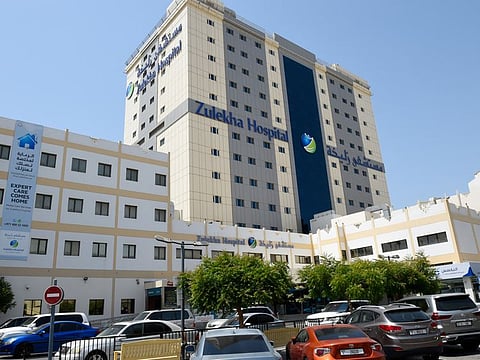UAE doctors conduct 12-hour surgery to excise tumour in patient’s eye
Tumour that started in the eye, also invaded nasal cavity and parts of the patient's brain

Also In This Package
Dubai: In a complicated 12-hour surgery conducted jointly by the Ear Nose Throat (ENT) and neurosurgery team at Zulekha Hospital, doctors saved the eye of a patient suffering from a rare cancer. The tumour diagnosed as Alveolar rhabdomyosarcoma, which started in the eye, had also invaded the nasal cavity and parts of the brain. The surgery conducted jointly under Dr Tamer Mohamed Attia, consultant otolaryngologist, ENT specialist, and Dr Ravi Dadlani, consultant neurosurgeon at the hospital, not only excised the tumour but also saved the eye of the patient.
Huge mass in left eye
Elaborating on the case, Dr Attia said the patient came to the oncology department of the hospital with a left orbital swelling and proptosis (protrusion of the eyeball). Examination and imaging revealed the presence of a huge mass involving the left orbit, including the left sinonasal cavity, the nasopharynx, the skull base with intracranial extension. A biopsy confirmed the case and the patient was treated with chemotherapy and the tumour was responding very well to it. However, the nasal and cranial parts were not responding.

The patient underwent a combined approach surgery where the ENT surgeon entailed endoscopic removal of the entire “macroscopic” tumour from the nasal cavity, all the paranasal sinuses, the nasopharynx and the skull base, while the neurosurgeon has done a craniotomy to remove the intracranial part of the tumour.
Saving the eye was important
Dr Attia added: “We planned the surgery in a manner to give a chance to preserve the patient’s eye and leave the tumour margins for a post-operative combined radio and chemotherapy. The [intraorbital] part of the tumour was responding very well to chemotherapy prior to the surgery.”
In an elaborate explanation, Dr Attia explained the full impact of the invasive tumour. “From the ENT perspective, the tumour would have continued to grow and invade all the cranial nerves related to anterior and middle skull base, cross midline and impact the right side nose and paranasal sinuses, which had already started to happen and the intracranial impact had already happened. Thankfully, the distant blood and lymphatic metastasis had not yet occurred. From the neurological perspective, she could have had seizures or strokes with the cancer impacting the brain, which could ultimately have been fatal.”
Dr Dadlani gave a neurosurgeon’s perspective. “She had a large sino-nasal tumour that had eroded the base of the skull and extended into the brain. She had initially been treated with chemotherapy, but the tumour had stopped responding to it. The neurosurgery entailed a major surgery (craniotomy — the opening of the skull), approaching the tumour, which had impacted the brain, and then repairing the defect in the skull.”

Long road to rehabilitation
The patient recovered with no evidence of any residual macroscopic tumour in the nose or PNS on the next day as per the post-operative CT. However, the journey with treatment is still long with post-operative radio and chemotherapy to ensure complete eradication of the tumour.
Sign up for the Daily Briefing
Get the latest news and updates straight to your inbox









